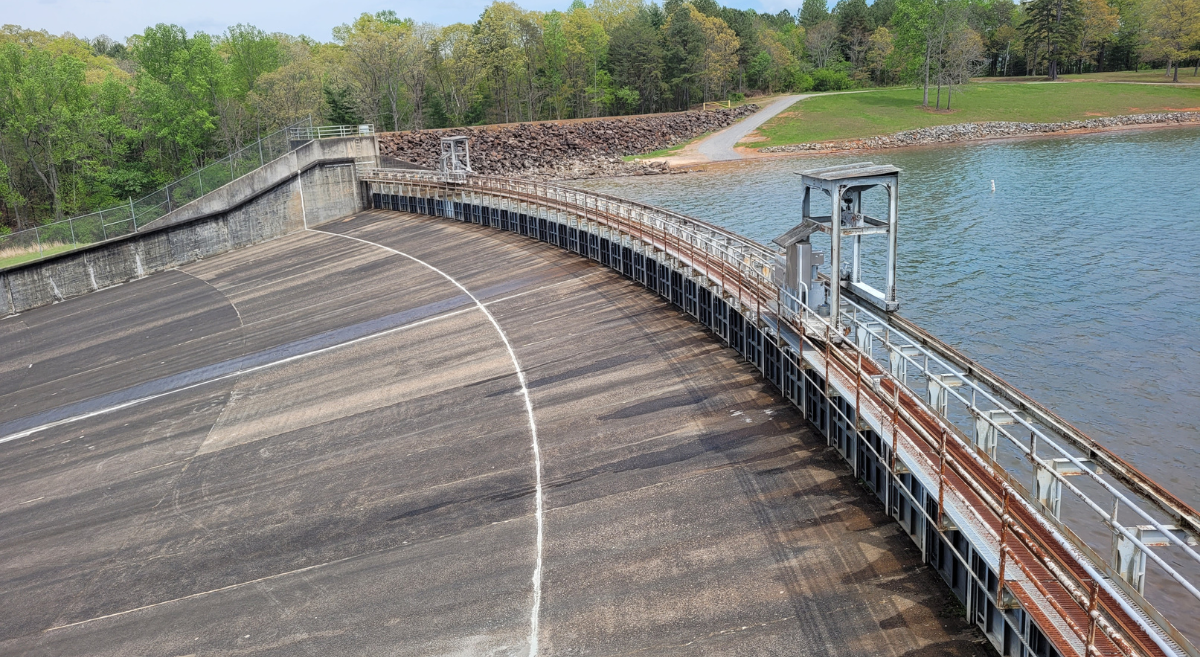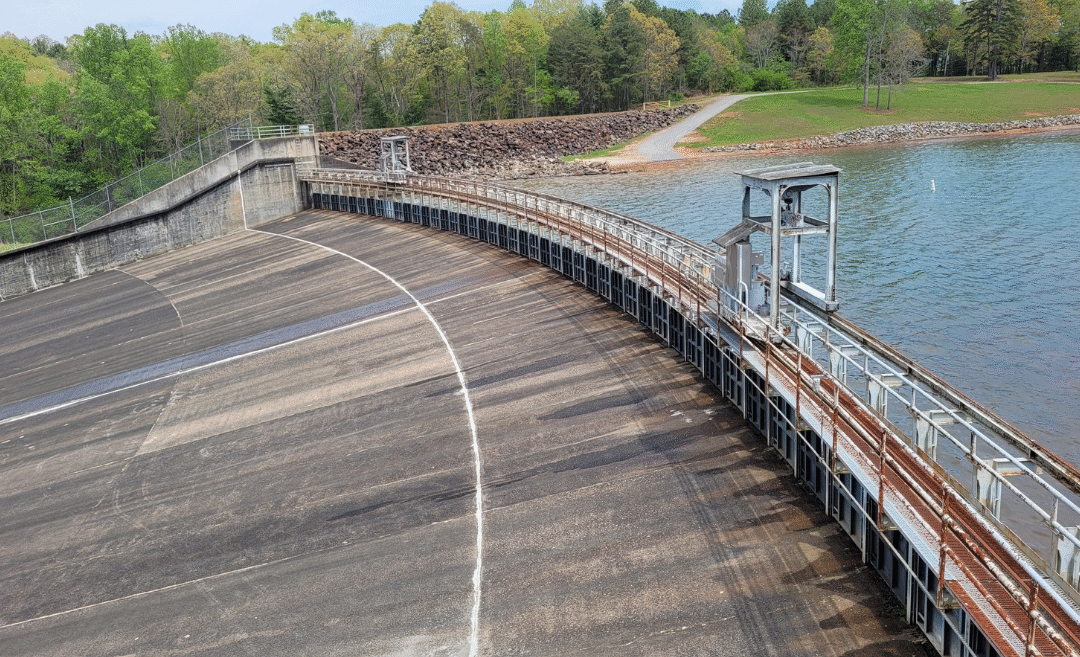MountainTrue’s Comments: Lake Chatuge Dam Safety Modifications Scoping Period

May 27, 2025
Erica McLamb, NEPA Project Manager / 1101 Market St. Chattanooga, TN 37402
Re: Chatuge Dam Safety Modifications Scoping Period Comments
Dear Ms. McLamb,
I am submitting these comments on behalf of MountainTrue and our 12,000 members and supporters across the Southern Blue Ridge, approximately 600 of whom have homes and/or businesses in Towns County, Georgia or Clay County, North Carolina, and many more who regularly visit the area to use Lake Chatuge for camping, boating and other water-based recreation activities.
First and foremost, we recognize the need for the Chatuge Dam Safety Modifications Project to take place and fully support TVA’s goals of “reducing the potential risk and ensuring the dam’s long-term safe operations.” We have appreciated working with TVA staff during the scoping phase of the project. TVA dam safety project manager Chris Saucier, in particular, has been so respectful of all the many repeated questions and complaints, patiently addressing them during interview after interview and in hours of public meetings. The level of engagement with the public and elected officials has been excellent so far. We hope our comments will be helpful in order to further refine this project and avoid or minimize any adverse impacts to the environment and our communities.
In my past experience with scoping for federal projects, alternatives are typically not presented yet and information received during scoping is used to craft the alternatives that are then presented in the Environmental Assessment or Environmental Impact Study. However, since alternatives have been presented during scoping, provided our concerns outlined in this letter about a very deep and prolonged drawdown can be adequately addressed, MountainTrue supports “Alternative E: New Spillway and Repairs to Existing Spillway.” Since storms haved occured more frequently and are often more intense in recent years, and since these trends are likely to continue with continued warming of the planet, having a new spillway with similar capacity to the existing spillway and repairing the existing spillway for use during rare, extreme weather events would provide more resilience for dam operations going forward. While this alternative will likely be the most expensive one, the fact that Lake Chatuge is so high in the Hiwassee River headwaters and is the first dam the system might justify this added expense.
MountainTrue champions clean water, resilient forests, and healthy communities in the Southern Blue Ridge. We and our predecessor organization the Hiwassee River Watershed Coalition have been monitoring Lake Chatuge and the streams flowing into it for more than 20 years. We have also successfully reduced inputs of excess nitrogen and phosphorus into the lake following an extensive study that was conducted jointly with TVA in 2001 & 2002 showing that excess nutrients were a primary cause of poor ecological health ratings in the lake. Lake Chatuge continues to be a priority of our clean water program. However, MountainTrue is also committed to maintaining healthy human communities across our region. These comments reflect both programmatic goals.
Significant adverse impacts to our economy. Lake Chatuge is unique among the 47 reservoirs TVA owns and manages. In fact, Lake Chatuge is very different from the other five reservoirs in the Southern Blue Ridge in that it’s the lifeblood of Towns County, Georgia. Towns County’s County seat — the City of Hiawassee — is literally “on the lake,” bounded by miles of shoreline on its western side. Also, unlike other mountain reservoirs like Hiwassee, Apalachia, and Fontana, the vast majority of Lake Chatuge’s 132-mile shoreline is privately owned, with many campgrounds, marinas, and tourist lodging.
In an area where lake-based home ownership, tourism and recreation drive local employment, small business, and county tax revenues, even a single summer of a deep drawdown to the proposed 1908 elevation could result in economic collapse, particularly in Hiawassee, Georgia at the upper end of the lake. According to a 2021 University of Georgia assessment, Towns County alone derives $117.4 million annually from tourism, supporting 1,362 jobs, which constitutes 24% of the county’s employment.
We strongly urge TVA to develop and adopt new plans for accomplishing this project that maintain reasonable summer pool levels during construction. Our communities are accustomed to winter drawdowns and deeper drawdowns during the winter could likely be tolerated without much adverse economic impact; however, impacts on marinas from a record low drawdown (even in winter) should absolutely be analyzed. Significant drawdowns between Memorial Day and Labor Day are what should be avoided to prevent severe community economic impacts. While TVA may not presently classify this situation as a structural emergency, our communities are already experiencing negative economic impacts, particularly in the real estate market just from the announcement of the proposed implementation of this project, due to the fear of summertime deep drawdowns over several years.
Adverse Impacts to the City of Hiawassee’s public drinking water supply. The City of Hiawassee and surrounding commercial businesses and residents of Towns County rely on Lake Chatuge for their drinking water supply. Prolonged low lake levels may reduce intake efficiency, increase sediment and turbidity loads, and strain filtration and treatment systems. Officials in Hiawassee have already expressed serious concern about the capacity of their municipal water plant to function under sustained deep drawdown conditions. The system experiences maximum pressure during the summer months, so limiting summertime drawdowns may also alleviate some of these concerns.
Adverse impacts to water quality in both the lake and river downstream. The City of Hiawassee’s municipal wastewater treatment plant discharges into Lake Chatuge under a National Pollutant Discharge Elimination System (NPDES) permit. NPDES permit limits are developed based in part on the assimilation capacity of the receiving water “to ensure that the discharge does not hurt water quality or people’s health.” A prolonged very deep drawdown would change the lake conditions under which the permit was issued, which could result in water quality problems in the vicinity of the discharge, even when the plant is operating within permit requirements.
MountainTrue also has concerns about downstream fish and aquatic life communities due to possible changes in water temperature and turbidity associated with the drawdown. Although downstream waters don’t carry the supplemental trout classification and are not stocked by NC Wildlife Resources Commission, there is a significant trout population and the river is regularly fished by locals and tourists alike, and at least two professional guide services operate regularly on the river downstream.
Adverse impacts to littoral and riparian habitat. MountainTrue is concerned about impacts to wildlife during a yearslong deep drawdown of Lake Chatuge, including wading birds and overwintering waterfowl. Threatened and endangered species of wildlife and plants like bald eagles, bog turtles & green pitcher plants, the latter two of which are found in marshy shallows around Lake Chatuge could also be negatively impacted by an extensive drawdown.
TVA has always been a reliable partner in our communities for both clean water and economic development. We are counting on TVA to thoroughly analyze these and other potential impacts and to chart a new path for completing this project that avoids or minimizes them.
Thank you for the opportunity to comment. We look forward to the draft EIS and more public engagement by TVA.
Sincerely,
Callie Moore, MountainTrue Western Regional Director

